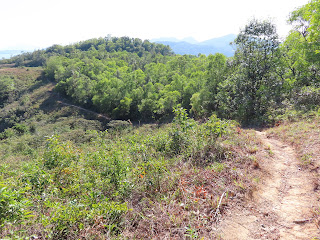Weaving together various observations and musings -- usually pertaining to aspects of Hong Kong (life) but sometimes beyond.
Saturday, December 31, 2022
Red leaves and critter spottings at the Hong Kong Wetland Park :) (Photo-essay)
Friday, December 30, 2022
China's National People's Congress Standing Committee deals a death blow to Hong Kong judicial independence

Facing or fearing prosecution under the law, or concerned about threats to Hong Kong’s freedoms, many lawyers and legal academics have quietly departed, mostly to Britain, Australia and North America.One Hong Kong solicitor who has relocated to England told Reuters that she knew of at least 80 Hong Kong lawyers who had moved to Britain since the security law was imposed in June 2020. Another lawyer, now living in Australia, estimated that several dozen Hong Kong lawyers had moved there.
Some are preparing for the possibility they may never return. Kevin Yam, a commercial solicitor and now vocal critic of Beijing’s crackdown in Hong Kong, said he took his mother’s ashes with him when he departed for Melbourne in April. “I wanted to be fully prepared, given the way Hong Kong is going,” Yam said. “If I couldn’t ever get back to Hong Kong, I didn’t want to leave her there.”
In mid-2020, Kwok found GPS tracking devices under his car “twice in one week,” he said. He provided Reuters with a picture of one of the devices – a small, black rectangular case containing a SIM card to relay positioning data to another device.
Threats were delivered to his office, he said. On one occasion, Chinese “funeral money,” fake paper money sometimes burned by the graveside in a folk tradition, was sent to his office with a note, Kwok recalled. “‘You will be needing these very soon,’ the note read,” he said.
In November 2020, Kwok and three other pro-democracy lawmakers were ousted from the Legislative Council after China’s [legislative body] ruled that sitting members could be disqualified if deemed a threat to national security. That month, Kwok quietly slipped out of Hong Kong. He said articles in the pro-Beijing press, calling for his arrest and accusing him of being a foreign agent, also spurred him to leave
“After they disqualified me,” he said of the... move to oust him, “it was very clear the writing was on the wall.”
Wednesday, December 28, 2022
Hong Kong will do away with many pandemic regulations and restrictions tomorrow but this doesn't mean that normality is anywhere in sight still!
Monday, December 26, 2022
Seasons greetings, and a tourism plus pandemic update!

Saturday, December 24, 2022
The Narrow Road centres on -- and is anchored by -- an ordinary hero (Film review)
Thursday, December 22, 2022
Hiking on an alternative route less taken between Mui Wo and the Trappist Monastery pier (Photo-essay)
Tuesday, December 20, 2022
A tale of two bars: one now closed; the other of which may still be around but has been negatively affected by the pandemic too



























